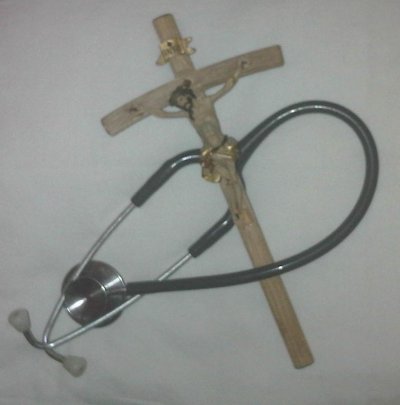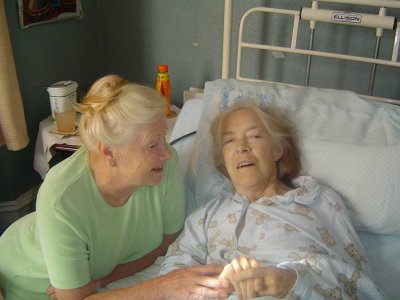Catholic Medical Quarterly Volume 62(2) May 2012, 11-12
Practical medical ethics
Praying with patients
By Dr Robert Hardie.
 Question:
Question:
I am a GP and it is my clinical opinion that a patient I see quite
often presents with problems that at least in part are spiritual. How
should I deal with this without being accused of imposing my beliefs on
vulnerable people?
Response:
To begin with, I do not believe that you or any other Christian doctor / nurse / allied healthcare professional / minister of religion or passing evangelist is imposing your or their beliefs simply by stating them. It is a “take it or leave it” situation. You are offering your professional advice and personal advice too, if as a professional person you think that some personal advice is appropriate; you are offering help from one human being to another human being (which is the bed rock of the Art of Medicine) and the recipient is free to take your advice or reject it and also be free to seek a further opinion if he or she so wishes. In May of this year the GMC took Dr Richard Scott to task for, what I understood at the time, was his decision to share details of his own Christian experience with a patient who, it seems, had already given his consent to listen to Dr Scott. As far as I know nothing further has come of this (there has been nothing else reported in the Telegraph) and both the CMA and CMF felt that the GMC had grossly over-reacted. You are free to give any advice you wish as long as you do not insist that the patient follows it.
As a Christian doctor, especially one belonging to the Catholic Church and presumably abiding by the teachings of Mother Church, you are not only sharing your own views of life but are actively pointing the way to the Absolute Truth. There has never been any other absolute truth revealed to the world than the Teaching, Life, Passion and Resurrection of Jesus Christ as the fulfilment and continuation of the enlightenment given to the ancient world through the Jewish Nation. Not only are you sharing this correct and certain truth but you have the opportunity (and obligation) to pass on the Good News of the Forgiveness offered to all mankind (the theological concept of such forgiveness is unique to the Judaeo-Christian tradition) and the joy of the promise of eternal life. What could be more life and health giving than that? Corrie ten Boom in the book, “The Hiding Place”, describes a reconciliation that happened after the War between herself and a former SS guard, which made her realise “that it is not on our forgiveness any more than on our goodness that the world’s healing hinges, but on His. He gives, along with the command, the love itself.” As she unwillingly took the former guard’s extended hand she felt what seemed to be a current pass down her arm and into her hand, and a love in her heart that almost overwhelmed her.
I do find that I have to ask, just what do you as a Catholic GP believe? Do you really believe that Jesus is God? Do you believe in the power of God seen for 2,000 years through the prayers of His friends in every generation? Do you believe in the ultimate and redemptive nature of suffering that fulfils in such a mysterious way the sufferings of Christ, and that no suffering is ever wasted (despite this it is our job to relieve it and not extend it!).
Having said this, I do understand the question, and appreciate how easy it is to be influenced by the political correctness that swamps our poor spiritually impoverished society, and to be concerned about the “vulnerability” of the patient. To this I would say that we are all vulnerable, especially when we are trying to share our faith with another in this secular world. The Lord made Himself totally vulnerable out of His own free will. Only in this weakness and vulnerability is it possible that souls can meet and attempt to be one. Within this lies some of the mystery of how patients contribute to the ongoing healing of their doctors! We have to make ourselves vulnerable and come alongside the patient in mutual vulnerability otherwise we remain a far distant figure on a medical pedestal dictating remedies but never allowing ourselves to be the channels of healing so desperately needed by a diseased and deranged world.
 Finally,
on a gentler note, it is obviously imperative that spiritual problems
are approached in a very sensitive way. If the inveterate and unique
dignity of the patient is always born in mind, then I do not believe
that any problems will be encountered. Years ago, in our practice, we
produced a questionnaire based on John Powell’s Vision Therapy, in which
patients were invited to tick answers on questions covering the five
major areas in our lives, Ourselves, Others, Life, The World and God.
Patients then returned to discuss their completed “homework”. This gave
easy access to where some spiritual problems lay and what they could be,
without the need to risk initially shocking patients in the surgery with
an over zealous verbal onslaught and a too direct type of interrogation.
Finally,
on a gentler note, it is obviously imperative that spiritual problems
are approached in a very sensitive way. If the inveterate and unique
dignity of the patient is always born in mind, then I do not believe
that any problems will be encountered. Years ago, in our practice, we
produced a questionnaire based on John Powell’s Vision Therapy, in which
patients were invited to tick answers on questions covering the five
major areas in our lives, Ourselves, Others, Life, The World and God.
Patients then returned to discuss their completed “homework”. This gave
easy access to where some spiritual problems lay and what they could be,
without the need to risk initially shocking patients in the surgery with
an over zealous verbal onslaught and a too direct type of interrogation.
